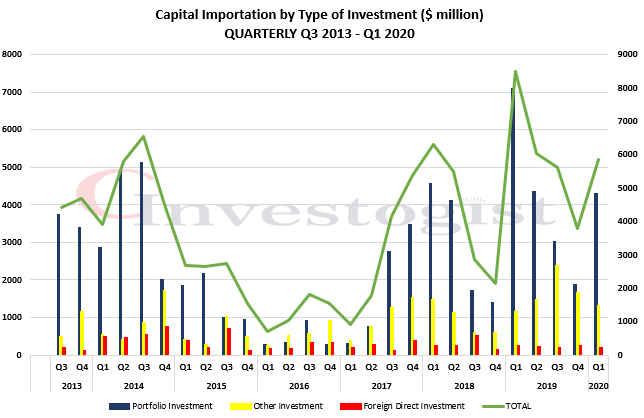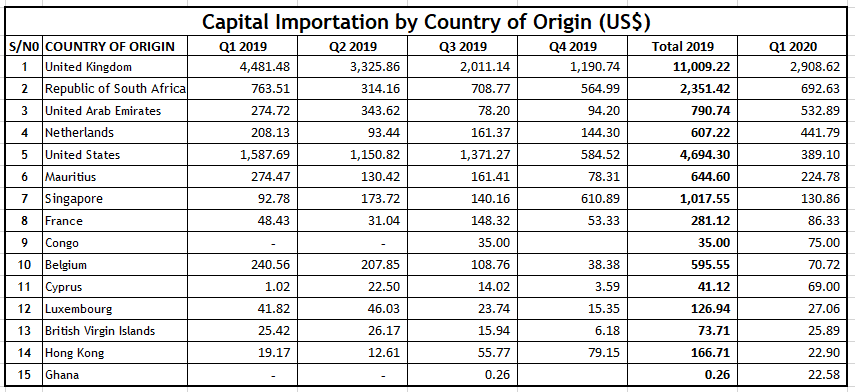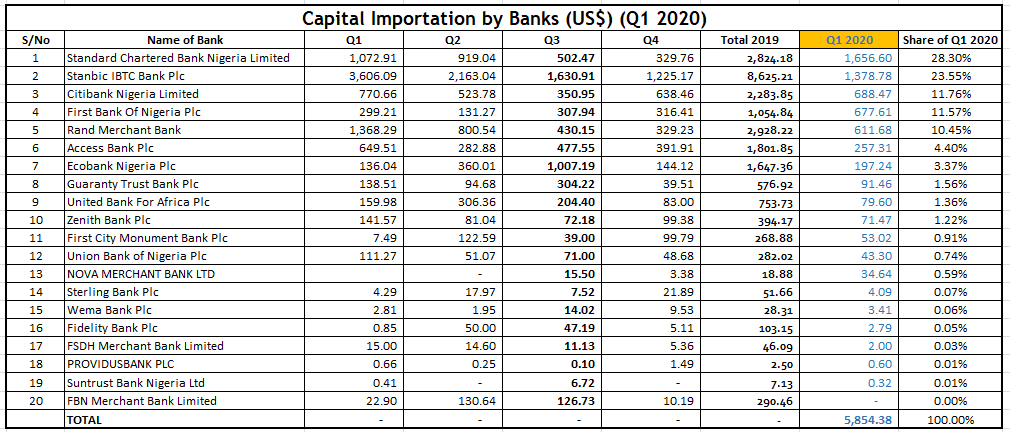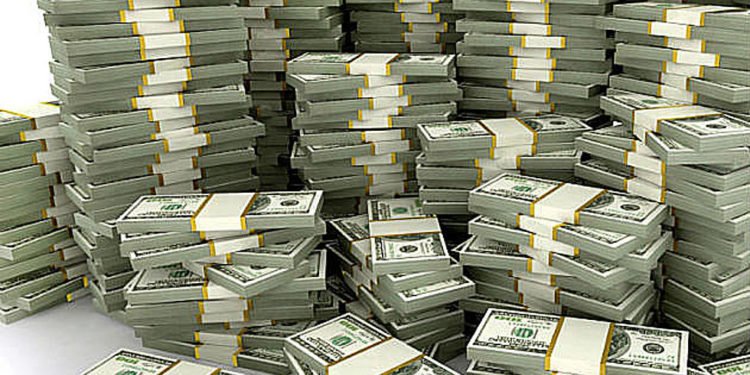According to the Nigerian Capital Importation data for Q1 2020 released by the National Bureau of Statistics seen by Investogist, the total value of capital importation into Nigeria stood at US$5,854.38m. This represents an increase of 53.97% compared to Q4 2019, and a decrease of 31.19% compared to the Q1 2019.
Of the three types of capital importation received, Portfolio investment accounted for 73.61% (US$4,309.47m) of the total capital importation, followed by Other Investment, which accounted for 22.73% (US$1,330.65m) of total capital. Foreign Direct Investment FDI accounted for only 3.66% (US$214.25m) of total capital imported in Q1 2020.

Fig 1: Capital importation into Nigeria
The term portfolio investment covers a wide range of asset classes including stocks, government bonds, corporate bonds, real estate investment trusts (REITs), mutual funds, exchange-traded funds (ETFs), and bank certificates of deposit. Portfolio Investments into Nigeria is further divided into four categories;
- Portfolio investment; which accounted for US$4,309.46m, up 128.79% QoQ and down 39.36% YoY.
- Equity; which accounted for US$639.72m, up 80.89% QoQ and down 2.52% YoY.
- Bonds; which accounted for US$231.22m, up 388.23% QOQ, and down 59.23% YoY.
- Money Market Instruments; which accounted for US$3,438.54m, up 131.93% QoQ, and down 41.55% YoY.
Overall, Portfolio Investment that came into the country increased by 128.79% Quarter on Quarter (QoQ) up from the US$1,883.58m received in Q4 2019, and decreased by 39.36% YoY down from the US$7,106.16m received in Q1 2019.
Read also; Nigeria Headed for a Deeper Recession, to Shrink by 8.9%: Finance Minister
A foreign direct investment (FDI) is an investment made by a firm or individual in one country into business interests located in another country. Generally, FDI takes place when an investor establishes foreign business operations or acquires foreign business assets in a foreign company. However, FDIs are distinguished from portfolio investments in which an investor merely purchases equities of foreign-based companies.
FDI into Nigeria is further divided into three categories;
- Foreign Direct Investment; which accounted for US$214.25m, down 16.71% QoQ, and also down 13.39% YoY
- Equity; which accounted for US$213.84m, down 14.31% QoQ, and also down 13.31% YoY.
- Other Capital; which accounted for US$0.41m, down 94.67% QoQ, and also down 41.40% YoY.
Overall, the Foreign Direct Investment in Nigeria in the quarter in review dropped by 16.27% QoQ from the US$257.25m recorded in Q4 2019, and decreased by 13.39% YoY down from the US$247.37m recorded in Q1 2019.
Other Investment is further divided into 5 categories;
- Other investment; which accounted for US$1,330.65m, down 19.92% QoQ, and up 15.21% YoY.
- Trade credits; which accounted for US$0.05m, remaining flat both QoQ and YoY.
- Loans; which accounted for US$559.79m, down 62.20% QoQ and also down 25.95% YoY.
- Currency deposits; which accounted for US$0.82m, down 72.13% QoQ, and remained flat YoY.
- Other claims; which accounted for US$769.99m, up 333.42% QoQ, and also up 92.97% YoY.
Overall, Other investment decreased by 19.92% QoQ from the US$1,661.55m recorded in Q4 2019, and increased by 15.21% YoY from the US$1,154.95m recorded in Q1 2019.
Read more; Investors Enjoy N694.33 Billion Gain in a Flawless Bull Run
As often is the case, 87.7% of all the capital imported into the country went to Lagos state, with 12% going to Abuja (FCT). 6 States received the remaining 0.3% of Investment. The other 29 States of the Federation received ZERO investment of any Type in the quarter in review.

Fig 2: Destination of the Capital Imported into Nigeria in Q1 2020
Most of the Capital Importation into the Country came from the United Kingdom, accounting for 49.68% of the total capital inflow in Q1 2020.

Table 1: Capital Importation into Nigeria by Country of Origin in Q1 2020
By Bank, Standard Chartered Bank Nigeria Limited emerged at the top of capital investment in Nigeria in Q1 2020, with US$1.656.69m, 28.30% of the total capital inflow in the quarter.

Table 2: Capital Importation into Nigeria by Bank in Q1 2020
Unfortunately, all the capital importation, whether up or down will have little or no effect in the real economy. This is because aside from the fact that 73.91% came in as Portfolio investment, 87.81% of the total capital imported into the country went to the banking (51.08%), Financing (22.77%) and for buying shares (13.96%).
The main drivers of the Nigerian Gross Domestic Product as reported by Investogist on Saturday, received very little of the capital. Agriculture, Industry, Trade and Construction that combined contributed 61.31% to Nigeria’s GDP in Q1 2020, collectively received only 8.14% of the imported capital.

Table 3: Capital Importation into Nigeria by Bank in Q1 2020
The Nigerian economy needs massive investment to give it a much needed boost, but this will not happen unless there is a convincing policy direction by the government, on both state and federal levels of government. The fact that 29 out of 37 states in the country could not attract a foreign investment of any kind speaks to the absence or ineffectiveness of economic policies being made in the majority of state capitals in Nigeria.
Read; Only 4 States Generated Internal Revenue Greater Than its Federation Account Allocation in 2019
Should the country go into recession as is being projected in many quarters (including at the nation’s Federal Ministry of Finance, Budget and National Planning the way out of that hole is long, dark and bleak.
Written by;
Nnamdi M.





















































